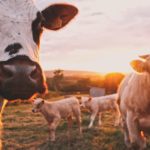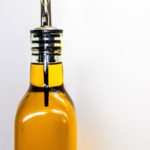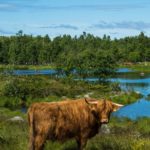Tasmanian startup Sea Forest has partnered with a major milk processor to trial its Reduced Emissions Feed Additive, the red seaweed Asparagopsis. Climate action is a major priority for Fonterra with methane emissions from dairy herds contributing to climate change, and this is one of several initiatives for the company.
What is a Reduced Emissions Feed Additive©?
Find out more about Reduced Emissions Feed Additives, and how they can help reduce the climate change impact of the world’s livestock herds. Learn about how they are made, how they work, and where to find them.
Using oil immersion to deliver a naturally-derived, stable bromoform product from the red seaweed Asparagopsis taxiformis
New paper examining delivery methods of Asparagopsis taxiformis has compared two methods and found one to be far superior. The methods compared were oil immersion and freeze-drying.
Burger King using lemongrass to reduce methane emissions from its meat suppliers
Burger King announced that it is selling burgers made with “Reduced Methane Emissions Beef” from July 2020. Lemongrass is being used as a feed additive to reduce their cows’ methane emissions by around 33%.
Red seaweed could cut emissions from cattle by 60 percent in Ireland
Supported by Dr Rob Kinley, an Ireland research station is exploring the use of Asparagopsis armata as a feed additive for Irish cattle. They estimate that it could help cut emissions in Ireland’s herds by up to 60%. The armata variety has been cultivated in County Galway and Ireland has a long history of hand harvesting seaweed.
The science behind FutureFeed® (Asparagopsis taxiformis)
Questions about FutureFeed®? Find out more about it, and how this variety of seaweed could help reduce emissions that are emitted by the world’s livestock populations. Find out what it is, how it can help, and where to find it around the world.
Sam Elsom swaps fashion for seaweed farming
Sam Elsom’s Instagram feed is looking pretty bare. The fashion designer and photographer hasn’t posted a fashion-related image on his feed since mid-2018, but following an interview with the Australian Financial Review, the reason why is clear – it’s because of seaweed. Specifically, Asparagopsis taxiformis, a variety of seaweed which has been shown in scientific tests to reduce the methane output of livestock such as cows. This means that seaweed could be a major solution to climate change.
Can red seaweed slash our methane emissions?
Asparagopsis comes in two varieties, warm water (taxiformis) and cold water (armata). Researchers and companies in New Zealand are exploring the effectiveness and commercial viability of the armata variety. This article also explores some of the challenges and obstacles identified with commercialising and using the seaweed as a feed additive.







